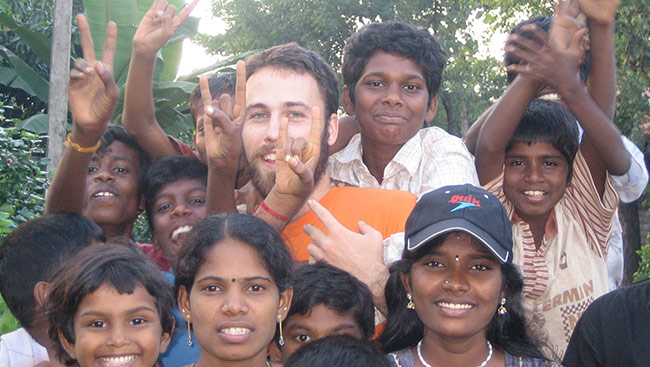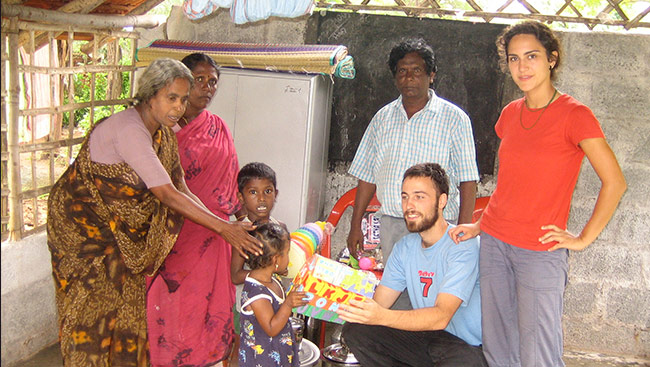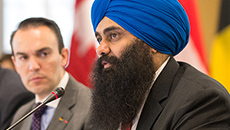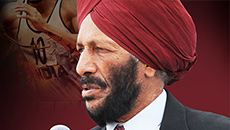As Canadians, when we are faced with a power outage, it’s such a big deal and a bit of panic sets in on how to manage the hours without electricity and heat, watching our favourite shows on television or doing work on our computers. What we forget is the reality of individuals around the world, who do not have electricity and are often surrounded by darkness as night approaches. In a rural village in India, this can make all the difference from succeeding in the world, especially when it comes to education, as children often rely on kerosene lamps which provide poor light, are expensive and create indoor air pollution, making it difficult to study or complete homework in the evening.
After visiting India several times, Vancouverite Jesse Eckert decided to take matters into his own hands and created the non-profit organization Right2Light, which installs solar systems in rural schools and provides students with re-chargeable lanterns, which they can charge at school during the day to ensure they have light to study at night. Furthermore, Right2Light focuses on cross-cultural education and skills building programs in an effort to assist Canadian at-risk or Aboriginal youth, along with poverty-stricken youth in India.

“I want Canadian youth to develop hands-on skills, improved-self confidence, global awareness and a better understanding of cultures outside their own country and their own, in addition to teamwork and problem solving abilities. I want them to have a journey, and it would be great if this trip helped foster a sense of environmental stewardship and global citizenship, but at the end of the day, I just hope that this trip shows them that they are intelligent, capable and can pursue their dreams, whatever they may be,” says Eckert, who is the founder and executive director of Right2Light.
Canadian youth will undergo workshops and training sessions in Vancouver, and will travel to India to install the solar panels, provide lanterns to students and teach basic English and mathematics to primary school students. Eckert goes on to say, “Right2Light will help Indian youth by giving them hands-on skills training alongside the Canadian youth. Indian school students will benefit from the solar installations by getting better lighting in their homes, which will improve their educational outcomes, reduce energy costs and pollution in their villages and encourage them to go to school so that they can recharge their lanterns.
The Indian youth will further benefit from the joint activities that will take place between them and Canadian youth, and will have the opportunity to learn the stories of Canadian youth, who may not come from wealthy privileged backgrounds. I’ve found that foreigners in India are often automatically considered very wealthy and Canada is usually seen as the ‘promised land,’ so I think it would be important for Indian students to hear this is not always the case, and that youth in Canada are also dealing with similar issues as them.”
At the time of our interview, Eckert was gearing up for his third visit to India, where he will be organizing the final details for Right2Light so everything will be in place when he brings a group of Canadian youth on his next visit as a pilot trip to initiate the program.

Eckert holds an International Masters of Environmental Science, Policy and Management and during the program, he undertook field research in Tanzania exploring the potential for community renewable energy projects to meet the needs of thousands of rural inhabitants without electricity. In addition, he undertook community development work in Tamil Nadu, India after the tsunami in 2005. He has over five years experience conducting environmental education programs with children, youth
and adults.
There are many organizations that strive to help those less fortunate around the world, and one thing that stood out about Right2Light was the cross-cultural aspect, in which vulnerable youth here in Canada are presented with educational tools and positive opportunities to rise out of a negative circumstance, while youth in India, who are often born into poverty, are being presented with the same opportunities to break out of the poverty cycle through education. I asked Eckert, why he wanted to focus on the medium of education to assist children and youth both locally and abroad and he replied with the following:
“Education, whether it is formal or not, provides us with tools and information in order to make better decisions. Education is also access; access to people, companies, school programs and information that can help you accomplish what you want to do. I also truly believe in the cliché quote: the more you know, the more you realize you don’t know anything. And that is a good lesson to learn as well, and this is important knowledge.”
As our chat came to an end, I asked Eckert to explain his connection to India, his love for this nation and its people and his innate need to assist youth growing up in rural villages, and his eyes brightened up as he explained, “I keep going back because I feel India can help re-set you and it helps put things into perspective. From my experience, India teaches you to be patient, compassionate, respectful, strong, witty, be open and to have a sense of humour. It forces you to get out of your comfort zone and can be a journey for your mind, body and spirit.”
Photo: Amanda Waschuk (Main Photo), Larissa Coser






